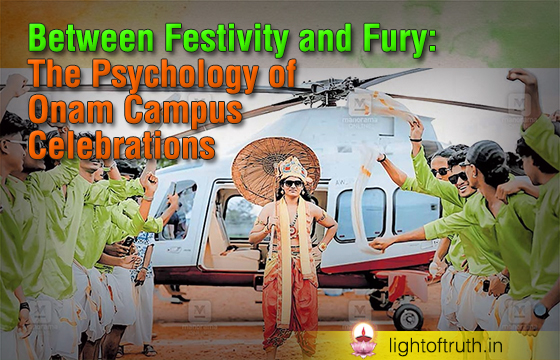Festivities of Onam in college campuses within Kerala tend to be characterized by intense excitement, creativeness, and cultural pride, but alongside the festive cheer, there is also a recurring pattern of violence and risk-taking behaviour among students. Psychologically, the actions are traced to a combination of developmental, societal, and cultural reasons. College-going students are an age group where peer acceptance, identity formation, and belonging to groups influence behaviour significantly. Onam as a festival that congregates students together in large numbers becomes a platform where gestures of dominance, power, and allegiance to one’s department or college are performed. Most times, this is taken to aggressive levels of competition, verbal conflicts, or even violence.
“Psychologically, the actions are traced to a combination of developmental, societal, and cultural reasons.”
“College-going students are an age group where peer acceptance, identity formation, and belonging to groups influence behaviour significantly.”
“The group environment of celebration also reduces inhibitions, producing a sense of invulnerability that leads to risk-taking.”
The group environment of celebration also reduces inhibitions, producing a sense of invulnerability that leads to risk-taking. Bike rallies, loud processions, or risky stunts during college celebrations are less about personal enjoyment and more about group recognition. The temporary suspension of academic pressure and the symbolic importance of Onam as a time of abundance and energy provide psychological justification for excessive displays of excitement. Alcohol use, though socially disapproved, sometimes finds its way into such gatherings, further impairing judgment and fuelling aggression. Onam campus violence is also influenced by the glorification of aggression in popular Malayalam films, where campus clashes and macho heroism are often romanticized. Students unconsciously imitate these portrayals, seeing violence as a thrilling or acceptable way to express dominance and group pride.
“Onam campus violence is also influenced by the glorification of aggression in popular Malayalam films, where campus clashes and macho heroism are often romanticized.”
“Backed by these behaviours is also a psychological desire to exercise masculinity, status, and group identity, which is frequently displayed through challenges to other groups.”
Backed by these behaviours is also a psychological desire to exercise masculinity, status, and group identity, which is frequently displayed through challenges to other groups. Symbolic competition between departments or campuses gets compounded under the celebratory atmosphere, where play turns into aggression. The crowd anonymity diminishes the sense of personal responsibility, and it becomes simpler for students to engage in dangerous or violent behaviour without considering repercussions. Onam being a festival of prosperity and harmony, the experience of celebrating it in the college campus shows how psychological tension overcomes the adolescent sense of exuberance, peer pressure, and the thin line between happiness and aggression.


